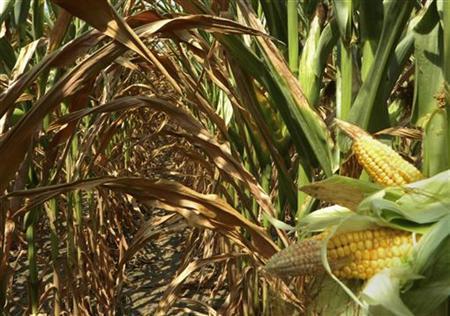House leaders feel heat for farm aid in drought
Date: 26-Jul-12
Country: USA
Author: Charles Abbott

Drought-damaged ears of corn and dry, brown stalks are seen in a
field near Georgetown, Illinois July 24, 2012.
Photo: Karl Plume
Republicans are getting scorched for sitting on a farm bill as the worst drought in decades shrivels crops and is forecast to drive up food prices for the next two years.
The $491 billion farm bill is stalled in the House of Representatives on concerns there are not enough votes in the Republican-controlled chamber to pass a bill many see as too costly.
So Republican leaders may try to quell growing criticism of the stalemate by seeking quick passage of a stand-alone disaster relief bill, according to farm lobbyists.
There is little more than a week before Congress rises for a recess that lasts until September 10 and Democrats already blame Republicans for lack of action to help farmers ahead of the November elections.
"We're seeing all across the country dried-up, parched land," said Senate Agriculture Committee chairwoman Debbie Stabenow. "This is a very serious issue for our farmers and ranchers, so we need a farm bill."
The Democrat-controlled Senate passed its farm bill on June 21, including disaster funds for this year. But the House version did not clear committee until July 12. It has been attacked for cutting too much from food stamps for the poor and doing too little to reform farm subsidies.
House Speaker John Boehner has not settled on a plan of action, said a spokesman. Options range from a simple disaster bill costing $300 million or a short-term extension of the 2008 law due to expire on September 30, said a congressional staff worker.
Representative Bruce Braley, an Iowa Democrat, is circulating a petition to force a vote on the farm bill. It would embarrass Republican leaders if a majority of the House agreed to force a vote and could set off an ugly floor fight since Tea Party-influenced lawmakers want bigger spending cuts everywhere.
"If they actually try to do disaster next week, it's just to inoculate members for the month of August," said Ferd Hoefner, a small-farm activist, since the House and Senate are unlikely to pass any bill in one week. "We want the real bill and we want it this year."
Food prices are likely to rise as much as 3.5 percent this year and as much as 4 percent in 2013, the Agriculture Department forecast on Wednesday, with higher crop prices driving up meat and dairy products.
By comparison, the overall U.S. inflation rate is estimated at 2 percent this year and 1.9 percent in 2013.
Iowa Senator Charles Grassley, a Republican, urged House action on the farm bill, citing President Truman's successful re-election campaign against a do-nothing Congress in 1948.
"When times are tough for farmers, they tend to be more active politically," Grassley said. U.S. farmers are traditionally fiscal and social conservatives.
The presidential election is unlikely to hinge on the farm bill this year but political handicappers say Democrats may gain 10 seats nationwide, cutting the Republican advantage to 30 seats from the current 50. Rural districts play a leading role when control of the House changes parties.
Dale Moore of the American Farm Bureau Federation believes the most likely outcome to the legislative stalemate is an extension of the 2008 law, with sufficient spending cuts to satisfy deficit hawks and a promise to pass full-scale farm bill reform next year.
"That's my sense of where they're going," Moore said.
But an extension would face opposition, too, for failing to make major cost cutting reforms.
"We all appreciate the dilemma the speaker is in, but we need a farm bill," said a farm lobbyist referring to Boehner. "Every option they look at is fraught with peril."
(Editing by Russ Blinch; editing by M.D. Golan)
![]()
© Thomson Reuters 2012 All rights reserved